If you’re reading this, there’s a good chance that you’re interested in traveling to Morocco, but are worried because you’ve heard it’s dangerous, especially for solo travel and even more especially for women. You’ve probably heard the men there treat women like shit, maybe even that they spit at them and harass them nonstop, so it’s really not safe for you to go there.
Well, GREAT NEWS! That’s mostly false! It’s actually safe and not terrifying in Morocco, which I would know since I just traveled around the country by myself for 10 days.
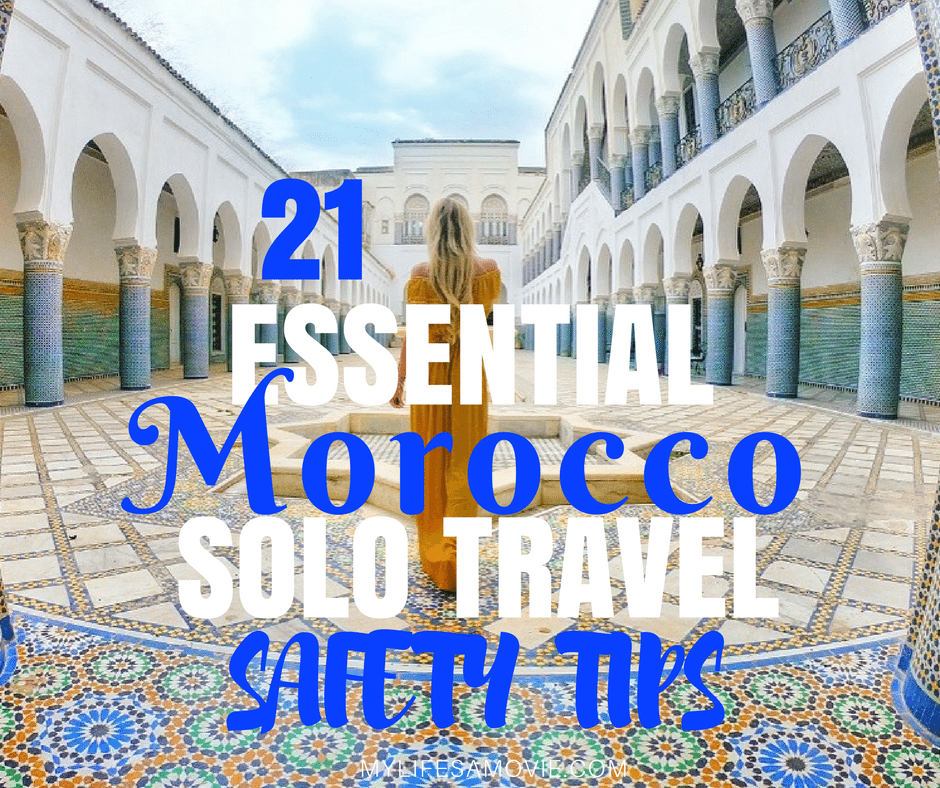
The problem is that humans are more prone to talk about bad experiences than good ones, and likewise, more prone to read about negative things than positive. Even I was guilty of reading the articles warning travelers to be weary of traveling alone in Morocco, and some even almost made me double think freak out about going! How lame is that?!
It actually wasn’t until I posted on Instagram that I found Morocco to be safe that other people started coming out and agreeing, and sharing their positive experiences!
So rest assured, all of the negative crap you’ve heard is either from a person who is not a good traveler, a person who is not used to other cultures, someone who thrives off of negativity, or a super rare occasion amongst tons of positive ones that unfortunately don’t make it on to the internet.
I had a phenomenal time, and I’m someone you’d look at and think would be a prime target for “danger” too! To give you a background of my solo travel trip in Morocco and the type of situation I was in: I’m a 5’5″, 110 pound, blonde hair, blue eyed, big boobed American, and I went by myself to Casablanca, Meknes, Fes, Chefchaouen, Tanger, and Marrakech. Without a problem.
Granted I’m also a professional solo traveler, but using my strategies and techniques is what kept me safe and unbothered, and is what’s going to help when it comes to giving you all advice!
So after my experience solo traveling in Morocco, here are the tips I’d suggest to make you feel more comfortable, keep you safe, and get you excited for an awesome time in this beautiful country!
Jump To:
1. Get All Negative Stereotypes and Horror Stories Out of Your Head

You know what’s going to make you feel unsafe? Constantly thinking in your head that something bad is going to happen. I was so guilty of this the first few days I was in Morocco that I almost smacked myself for wasting time worrying rather than enjoying the experience.
I was literally thinking in my head that men were going to be spitting at me, grabbing me, and that I might even get raped, because that’s what I heard happens to women, especially if they’re alone in Morocco. But nope, none of that happened, except when I denied a few teenage boys a selfie and they spit on the ground in protest. Good one guys.
Stereotypes are not fair, and they’re usually not accurate. So stop it. Now.
2. But Always Remain Vigilant
This is an important tip no matter where in the world you go. Just because I’m saying to get negative stereotypes and horror stories out of your head, does not mean that I think you should go and expect everyone to be completely innocent with the best intentions.
No matter where I am in the world, I act like I’m an undercover international spy or something, who’s always on the lookout for danger even though it typically never happens. I notice the guys eyeing me from around the corner, and the little kid coming up behind me on my right. I notice the guy on the scooter eyeing my phone and immediately put it in my pocket, and the woman selling henna examining the value of my bag.
Pretend to be a spy. Watch your surroundings, all the time. Plus “vigilant” is a really cool word to say.
3. Have an Understanding of the Muslim Culture

Here’s where I think the biggest problem lies; most people don’t have the slightest understanding about the Muslim culture aside from the stereotypes that are drilled into our brains from mainstream news in the U.S. Many people think of Muslims (as in…the entire population of millions of people……) and think “terrorists”, “women haters”, “anti-freedom of what you can wear”, etc.
Well for starters, if you automatically think “terrorist” when you think of Muslims, you suck. Second, you are in THEIR country, so you need to respect their culture.
This does NOT mean you HAVE to cover your head, go to their mosques, and eat their food, although you likely will want to try all of those. It means you need to be aware that they expect a certain level of class and decency, and that they have certain rules you need to respect.
For starters, most Muslim countries don’t drink, and it’s frowned upon to sleep in the same room as your partner if you’re not married. For non-Muslim travelers, it’s Ok (unless you’re in an area where it’s strictly prohibited), but don’t go flaunting it in public.
Also, DO NOT TAKE PHOTOS OF PEOPLE without their permission! Although their jellabas (traditional clothing) and hijabs (head coverings) look super “authentic”…well, they ARE authentic! These are REAL PEOPLE, and photographing/videoing them like they’re some sort of National Geographic special is offensive and invasive!
4. Learn a Few Phrases in Arabic (or French)
One thing that baffles me about the World is how almost every other country can speak at least a little bit of English, yet Americans don’t even try to learn another language. Learning a few basic phrases in the country you’re traveling to makes A WORLD of a difference, and can actually help keep you safe!
It’s not only a sign of respect, but if people think you know the language, they also probably think you know what’s up, and will be less likely to mess with you.
In Morocco, most people speak French, which is handy if you happen to have taken it in high school…but since they know it due to the French invading their country, I personally think it’s way better to know a little bit of Arabic. Trust me when I say it will get you a LONG way and everyone will love you.
Below are a few basic phrases that I know in Arabic, *spelled the way you would pronounce them:
- Salam : “Hello”
- Salam ah lee kum : Also “hello” but a more spiritual version that literally translates to “Peace to you”. Shows a lot of respect.
- Shukran : “Thank you”
- Laa shukran : “No thank you” *the most helpful phrase to know*
- Labess : “How are you” (a Moroccan term)
- Labess hamdula anta/anti : response to above, means “I’m good how are you?” and anta = to a guy, anti = to a girl
Other helpful words to know that you’ll see in Morocco:
- Riad: a huge traditional Moroccan home that is likely very ornate, and where you’ll be staying
- Hammam: traditional Moroccan bath house where you get scrubbed down
- Dirham: the currency
- Medina: market place
- Souks: stalls/vendors in the medina
5. Dress Appropriately

This is a no brainer, and probably something you’ve already heard, but it really is crucial to dress appropriately in Morocco, as well as any Muslim country. Cover your shoulders and legs as much as possible, and try not to flaunt your curves. If not out of respect, do it so that you don’t attract unwanted attention!
Again, you DO NOT NEED TO COVER YOUR HEAD (aka wear a “hijab”) and it’s NOT going to help you detract attention! A lot of people advised me to “cover my blonde hair”, but THINK people! Blonde hair = tourist, and tourists are crucial to locals because that’s how they earn a living. Covered head = Muslim woman, which are expected to dress and act a certain way, and typically the only women that Muslim men can marry. Which do you think is going to have it harder?
Almost every day, regardless of how hot it was, I wore either jeans or loose pants, a sleeved-top, and a scarf, or a long dress, a jacket, and a scarf. All of the photos you see of me wearing anything tight-fitting or showing my shoulders were taken in places where there were no people, where I was staying, or I took off a jacket and/or scarf just for the photo.
6. Communicate with Hosts Beforehand
During my solo travel trip to Morocco, I decided to stay only at AirBnB‘s, partially because it offered the opportunity to chat with the hosts. Unlike hotel receptionists and concierges, AirBnB hosts are typically locals who enjoy interacting with foreigners, and showing off their country.
All of my hosts were super nice and super helpful, and would help me arrange transportation beforehand, as well as honestly tell me how much I should be paying. They also helped me find local guides, taught me some Arabic words, and explained the background of the culture and foods!
Communicating with the hosts also ensures that someone knows when you’re coming, and where you’re going, so that they can notify someone if you don’t turn up where you should be.
7. Know Exactly Where You’re Going
To keep yourself safe from getting lost and wandering in the wrong areas, be sure to know exactly where you’re going and staying ahead of time. Write down all addresses, directions, phone numbers, etc., and take screenshots of your map route. Usually Google Maps will let you save routes to view later while your offline too.
While many locals will be more than willing to help point you in the right direction, many will also turn it into what they call a “tour” or service that they will try to charge you for. If someone tells you they can take you there, or that they just want to walk with you, be sure to tell them that you know where you’re going. And maybe also that you’re meeting a friend…or bust out a “Laa shukran”.
Knowing exactly where you’re going will also help prevent you from getting ripped off in cabs or dropped off at the wrong place. If you’re just arriving for the first time in Morocco like I was, I’d definitely suggest going online and using a car pick up service, or arranging it through your accommodation ahead of time.
8. Walk with Confidence and a Resting Bitch Face
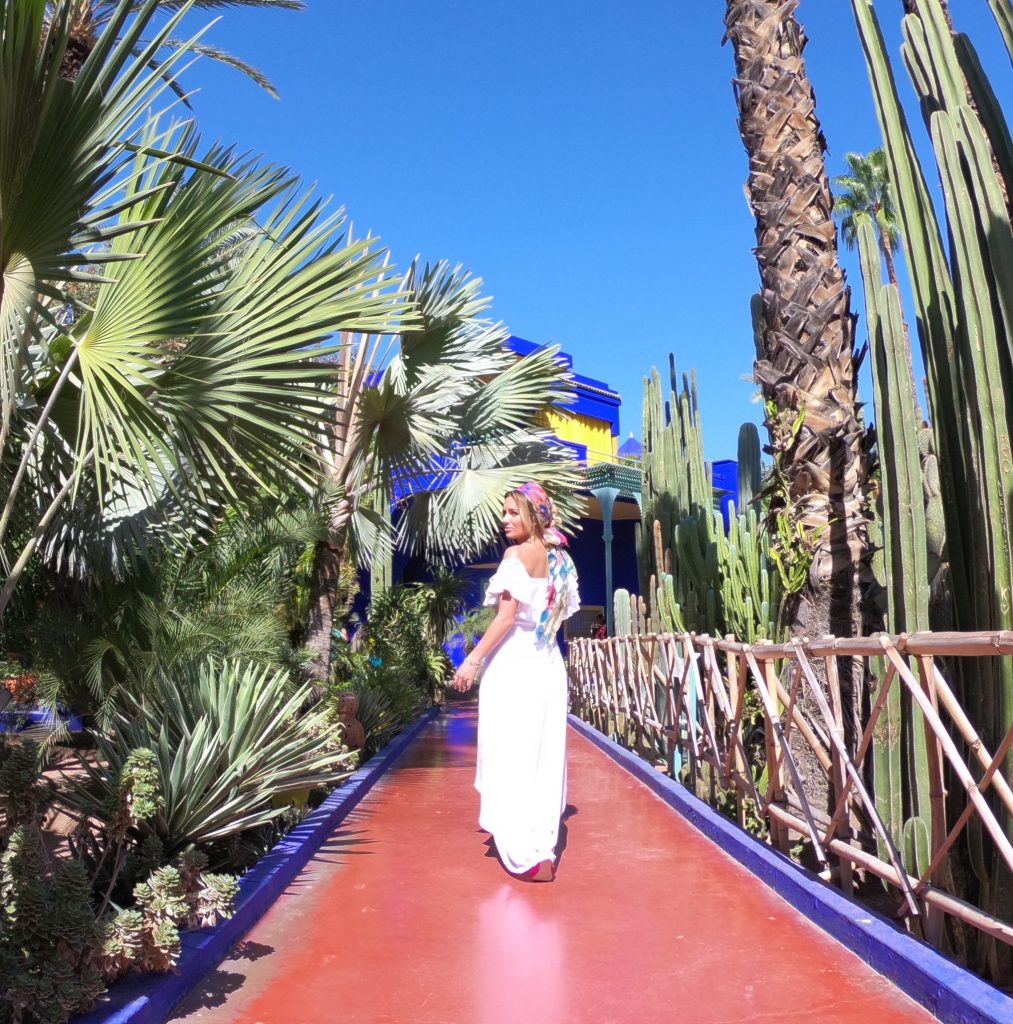
Typically I like to promote World Peace, happiness, and everyone being super nice to each other, but you have to be careful with that when you travel solo. Well, or in general really. This pretty much applies to everyone, since the second you look happy, it translates to “pushover”, which translates to “prime target for a scam or harassment”.
If you smile at everyone you pass by, you’re highly likely to get roped into a sales pitch, or an unsolicited comment about your appearance. Likewise, if you look scared or lost, you’re also likely to get an offer to be shown where to go…where you’ll later get charged for…
Nobody wants to mess with, or even talk to for that matter, someone who looks angry or like they know what they’re doing. Pair that with a few Arabic words and your gold.
Also, this goes for dudes too! When I was hanging out with a couple of Kiwi guys who were way to friendly to everyone, I noticed that they were getting roped into sales and scams left and right, yet the same people took one look at my Resting Bitch Face and didn’t even try.
Note: This does NOT mean be rude or mean to people. You can be polite and rock a RBF at the same time.
9. Have Some Sort of Connection
It might be hard to communicate with people if you don’t have some sort of connection on your phone. Usually I use a Wifi hotspot (I’d HIGHLY recommend the Skyroam Solis, you can also get 10% off using Alyssa10), but it didn’t work in the smaller/farther areas, so I turned on an international roaming plan with my cell provider (ATT…not highly recommended…).
The international plan I got included unlimited texts and really cheap international calling, which I actually did have to use a few times to get ahold of my drivers and hosts. If you have a phone that’s unlocked, you can get a SIM card for free at the airport when you arrive, and you’ll just have to pay to load it with data.
Even if you’re a pro at finding free wifi (like me), it’s always a good idea to have some sort of readily-available connection!
10. Know How Much You Should be Paying

Tourists are always going to get overcharged, so it helps to know what you should be paying. Keep in mind that some locals consider it fair for tourists to pay more than locals, which is hard to argue since there’s a good chance you make drastically more money than they do, but it’s still not cool to get ripped off.
Unfortunately taxis and car services to and from any airport charge a mandatory minimum of about 15 euros, so you probably won’t win by much there. But all other taxis are fair game for haggling prices, especially since it’s rare to find one that uses a meter. Essentially, if you travel smart, you shouldn’t be paying more than $5 for a “Petit Taxi” (small taxi as opposed to Grand Taxi).
You can get them for even cheaper by sharing them, which is super common, especially in less touristy areas like Meknes and Fes. If you don’t feel safe or comfortable sharing a car, pay more for your own. Regardless, always ask the fare before getting in the car.
The cheapest way to get to far distances is by using the CTM bus. This is a separate bus line than all the local buses, and is super clean, easy, and safe to use. Read more about using the CTM bus here.
11. Don’t Be Afraid to Say NO (and Know How to Say It)
You don’t owe anyone an excuse as to why you don’t want to buy something, or why you don’t want to talk. If someone is repeatedly trying to sell you something, or trying to talk to you, don’t be afraid to stand your ground and say no.
This again is where knowing how to say “laa shukran” helps out A LOT. It’s like a magical safe word that immediately stops people in their tracks and makes them turn away. Learn it, use it, but don’t abuse it. Simple saying “shukran” and shaking your head is also effective.
12. Know How and When to Ignore
Yes, people are going to try and talk to you. What sucks is that it’s nearly impossible to tell who just wants to talk to you (some people are genuinely curious, impressed, or want to practice English), and who has ulterior motives.
You’re going to randomly get asked where you’re from, “parle voux Frances”, “hablas espanol”, and “do you speak English”. These are all segways into a conversation that you may want to avoid. Sometimes it’s hard to ignore a direct question, and most of the time they’ll keep asking questions until you respond. But if you keep ignoring them they’ll eventually stop.
Avoiding eye contact and pretending like your fixated on something else (or your phone) can help. So can acting like you don’t speak any of the languages they’re asking about.
13. Know What Tricks and Scams to Avoid

As I mentioned before, a common scam is someone offering to help you find where you’re trying to go, then later asking for money for their help. Some will even blatantly say “I’m not asking for money”, then later suggest that you could help them out since they helped you out. Eye roll.
A similar trick/scam is a local offering to show you around for free, or give you a free tour, but let’s be serious. Nothing is free. To be fair though, depending on how you’re feeling and how savvy you are, it might be worth it to pay a local a couple of dollars to walk around with you!
Since I’m really good at recognizing and avoiding tricks and scams, I can’t give you any personal experience examples aside from getting massively ripped off on taxis, but I met a couple of dudes who told me about scams that happened to them:
- One guy from Poland said he started talking to a guy that waved him down, then started asking about doing a trip out to the desert. Polish guy was way to friendly and chatty, and ended up giving the impression that he was interested in doing the tour even though he wasn’t. Polish guy’s bus to the desert got stopped 6 hours out of the town by a group of men who were looking for him because scam guy in town said he agreed to do a tour with them. Moral: don’t be afraid to say NO.
- The Kiwi guys I met in Chefchaouen kept saying “maybe later” to all the people trying to sell them rugs, jackets, and hash…and they literally would not leave them alone the entire time. They remembered exactly who they were, and would stop them when they saw them and ask if they were ready to come buy something. The guys also told me that a few times people offered to smoke with them for free because they’re “friends” then afterwards got into arguments about buying the weed (Note: marijuana/hash is highly popular in the Chefchaouen region).
14. Always Choose to be Safe than Risk
Almost every night I stayed at a Riad that did not have a restaurant, and therefore almost every night I did not eat dinner. I’m claiming I was on a cleanse.
This is because I didn’t feel completely confident walking around or taking a taxi at night, so I didn’t even bother risking it. Even if it meant going to bed hungry. Luckily I remembered to bring a bunch of granola bars and buy water ahead of time which helped, as did booking places that offered dinner for an additional fee!
I also made the genius discovery of an online food delivery service in Marrakech which I ordered sushi from two nights in a row. It’s called www.fod.ma, and all you have to do is auto-translate the page (it’s in French), and know the exact name, address, and phone number of where you’re staying. They don’t even ask for your details or credit card info…they just trust you’ll be there with cash.
15. Let People Know Where You’re Going
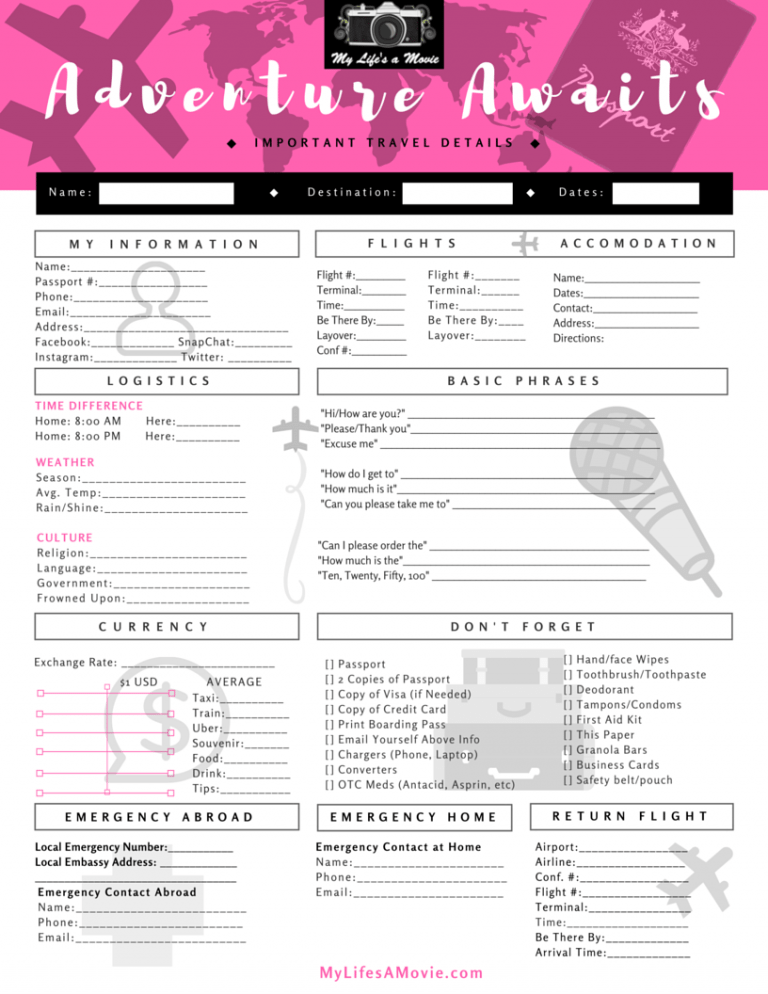
Typically I only do this to shut my mother up and to get my audience pumped, but it’s always good to let at least one person know where you’ll be going. For my mom (and myself for organizational purposes) I always type out my itinerary with which cities I’ll be in, where I’m staying, and how I’m getting there. I email it to her, and myself, so that I have it handy.
If you really want to be cautious/responsible, you can also enroll yourself in the STEP (Safe Traveler Enrollment Program) online. This puts a record of your whereabouts on file, and it also sends you travel alerts if there are any.
I also created a travel-planning form that makes it really easy to organize your information. You can access it here or save the image! ‘Use This One Form to Plan Your Travels’
16. Don’t Advertise Your Exact Location
By “let people know where you’re going”, I actually just mean your parents, the government, close friends, partner, etc. Don’t go advertising it online and making it easy for people to find you if they really wanted to.
I am SO BAD at this, since as an influencer, I’m constantly snapping where I am, but I can tell you from first hand experience, it makes you really easy to find. I’ve had people go to exact places where I’m at because they saw it in my Instagram story or Snapchat, so I try really hard to upload that footage after I’ve left!
You also don’t need to be telling any locals where you’re staying or going. Think about that Polish guy who told the man he was going on a Sahara desert tour on the local bus…it made it really easy for those other guys to find him. Don’t be like the Polish guy.
17. Don’t Try to Get Drunk (or Drink for that Matter)
As I mentioned before, most Muslim people don’t drink. It’s in the Koran; no drinking, but multiple wives are Ok…Religion is so weird. Anyway, the former part is great if you consider there won’t be any aggressive drunkards, but not so great for you if you want to drink. Or marry a Muslim dude (JOKES, most people don’t practice that anymore!).
Anyway, not only is finding alcohol somewhat difficult, but in certain areas it’s actually illegal, like Chefchaouen! Granted…there are ways around it (the restaurants will still sneakily sell you a bottle if you sit towards the back), but it’s slightly frowned upon, and even potentially offensive.
Plus, as with any country, if you’re drunk in public, it makes you a prime target for crime and harassment.
18. Don’t Forget to Set Travel Notices
You do not want to get to Morocco and get your debit or credit card shut off. Likewise, you also probably don’t want to get hit with outrageous roaming fees on your phone.
Before you leave your own country, don’t forget to set travel notices for your cards and your phone, to avoid any mishaps when you get there.
19. Bring a Couple Different Forms of Money
I’m really bad at even having a wallet (I kind of just tuck my cash into random pockets in my purses) and I didn’t have any problems losing money in Morocco, but I did have back ups just in case.
Not only do I spread my cards out in various wallet-type things, and hide a few too, but I also carry two pre-paid Visa gift cards (in lieu of old school travelers cheques) just in case.
I also give my banking information including wire transfer number to my mom in case I literally lose everything and have to wire myself money (only happened once so far).
20. Walk With a “Weapon” or Deterrent
Ok so don’t take this the wrong way…I’m not saying go and get an actual weapon! I’m just saying that I noticed a lot less people trying to talk to me when I was walking around with a heavy GoPro gimbal, or pretending to be talking on my phone…
The same thing typically happens when I walk around with my selfie stick out…especially when it has the tripod feet sticking out. I am just saying it looks like something you would not want to get smacked with. This is an at-your-own-risk tip though, because normally I would also suggest not walking around with anything expensive out too. But, to be honest, I always had my GoPro and iPhone in hand, albeit with a death-grip around both.
A reason why I usually do walk with these things in hand is because a phone is easy access for help, and can also easily stop people from trying to talk to you. I had a guy on a scooter keep stopping and waiting for me to catch up to try to talk to me, so I pretended to be on my phone (and angry) and he immediately sped off.
I carry the GoPros both because I want to film/photo everything, and because people are VERY determined NOT to be on film. That being said, you should never film anyone without their permission. But, if someone is saying something inappropriate to you or won’t leave you alone, turning on a camera is a really good way to get them to stop.
I may or may not have a video of me petting a kitten in Morocco, and in the background you can hear someone say “sexy”, then I turn the camera on them and they immediately run away.
21. Hire a Local Guide/Body Guard in Morocco

Perhaps the most genius solo travel safety idea that I’ve ever had was to hire local guides to double as my body guards and photography assistants. Not only did I get awesome information and insight on all of the areas that I was in, but having someone who speaks the language and knows their way around made a drastic difference when it came to people trying to sell things or holla.
To find local guides I simply asked my AirBnB hosts for referrals (in the more secluded cities), and in Marrakech I happened to find one online last minute on a website! After thoroughly explaining to him that I was NOT interested in seeing any more rugs, but rather cool places to take photos, we devised a plan for him to do the same thing for other solo travelers that I refer, so be sure to ask for the ‘My Life’s a Movie’ special solo travel “tour”! The link to his “tour” is below!
Marrakech Souks Tour Guide/Body Guard/Photo Assistant
So yeah! I hope my experience and all of these safety tips help you have an amazing time in Morocco! Please be sure to check out my other posts about Morocco, and remember that “sharing” is caring! 😉 Have some of your own tips to add or questions to ask me? I’d love to hear from you in the comments below!

Translator Personal Security Alert
Comfortable Valuables Belt Multi-Purpose Travel Locks
Passport Cover and Wallet
GoPro Hero 6 Alyssa’s Selfie-Stick-Tripod
Seeker Backpack Ballet Flats
Multi-Purpose Travel Scarf Long Sleeved Shirt
Wide Legged Pants Long Maxi Dress

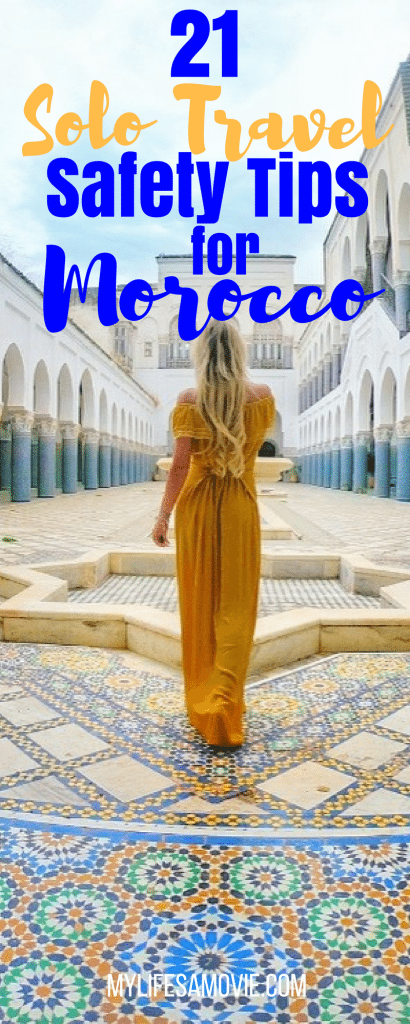
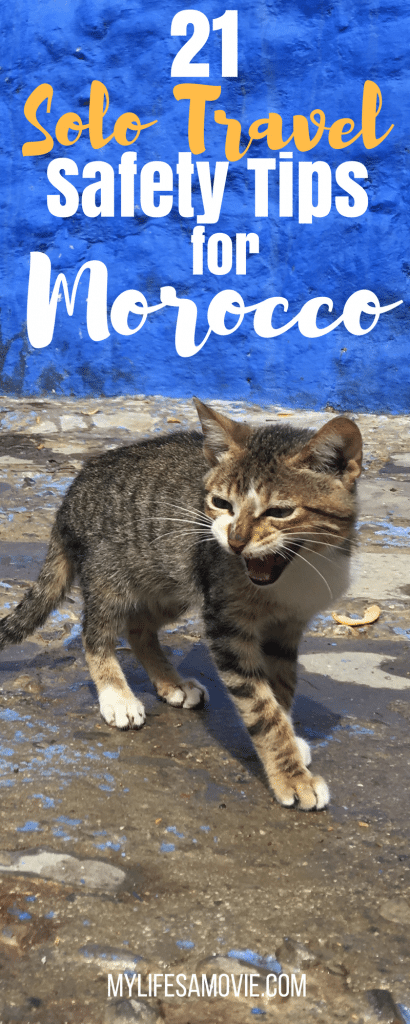
















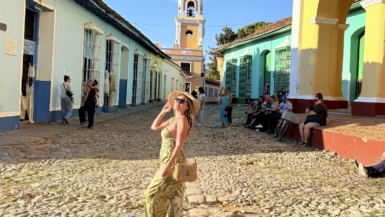
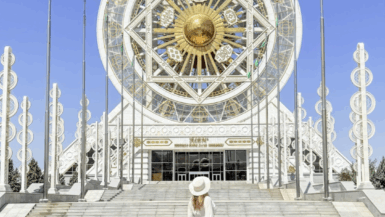
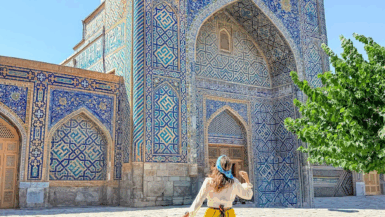
Like!! Really appreciate you sharing this blog post. Really thank you! Keep writing.
Really great article, thank you.
I’m a guy from England who looks Morrocan so I think I’ll fit in pretty well. When I travelled the states my Mum (correct spelling 🙂 bought me a belt with a little zipped pocket to store cash. If the worst happens and you lose everything you have some money and phone numbers written down.
Peace 🙂
So interesting to hear people travel in the States with a money belt!!! I never thought of it that way but can’t say I’m surprised! Speaking of the States…it’s pronounced and spelled “Mom” here. Haha
Hi Alyssa, I’m a female traveler looking to spend a week or so in Fes and Chefchaouen. I’m wondering who was your tour guide(s) in Fes? I’m looking to have someone trustworthy for at least a couple of days, partly to show me around and partly to help my mom not freak about tiny pale me wandering around Morocco alone 😛
Haha understandable but just tell your mom that I’m also tiny, light-skinned, blonde-hair, and blue-eyed and didn’t have a problem! I didn’t have an official guide, instead I asked my Airbnb host if he could arrange a taxi driver/guide for me for the day. I found in each of the places that I went that asking a local person/host was the best way to go, just be sure they don’t overcharge you! You can also try the website “Get Your Guide” to find local guides — that’s how I found mine in Marrakkesh! PS I’m doing a Group Trip there in September! 😉
Hi Alyssa,
I’m going to Morocco in a few weeks, and I found your article and just bought the shirt and passport cover from your list above, but the link for the pants doesn’t seem to be working. Any other similar travel pants you recommend? Thanks!
Thanks for letting me know Lily!! When you click it does any “product suggestions” pop up below it? If not, try doing a search for “women’s high waisted loose pants”, that’s usually what I look for!
Hey Alyssa!,
My friend and I are planning on visiting Marrakesh in June. We’re both females, and what you said about not walking around alone definitely make sense. Could you share a little bit more about how you found a bodyguard, what that process was like, and how much you paid for the service, please?
Thank you! Beautiful photos, by the way!
Hi Jessie! He wasn’t an actual bodyguard (my sarcasm doesn’t translate well over text haha) he was a tour guide that I hired and then immediately told him I did so so that he can be my body guard/photo assistant LOL! I think I included a link for him in the post but if not, you can look on sites like Get Your Guide! I did walk alone some times and it was fine, especially since I was always covered up…at most people just try to sell you things or call you beautiful!
Thank you Savita! Where are you from that makes the visa difficult? I was actually surprised with how easy it was for U.S. citizens so I’m very curious to know which countries it is hard for!